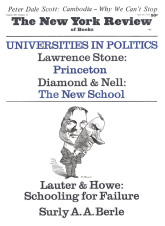To the Editors:
A dozen leading antiwar organizations announced last Wednesday they have banded together in a national coalition aimed at electing a peace Congress in November to cut off funds for the Indochina War.
The organizations, based at Columbia, Princeton, Harvard, and Rochester Universities, the Massachusetts Institute of Technology, and Dartmouth and Smith Colleges, already have established nationwide networks of lobbyists, volunteer workers, and fund raisers.
They will now pool their efforts to press for a cutoff of war funds by the current Congress, and to mobilize thousands of citizens and large amounts of money for use in the Congressional campaigns of peace candidates this fall.
The new body, which is establishing offices in New York and Washington, is called the National Coalition for a Responsible Congress.
Speaking for the coalition at a news conference, Professor James David Barber of the Political Science Department at Yale University said it was formed to bring under one umbrella several organizations that had been attacking the problem along separate avenues.
“The sudden expansion of the Indochina war, the murders at Jackson State and Kent State, and President Nixon’s flagrant usurpation of Congressional powers have shocked the nation,” Barber said.
“During the past three weeks, this mood of protest and anger has brought forth a number of new university-based organizations dedicated to ending the war through Congressional action.
“In order to increase their effectiveness by working together, representatives of several of these organizations have agreed to cooperate in the National Coalition for a Responsible Congress.”
The organizations involved include:
—The National Universities Anti-War Fund (Harvard and MIT)
—The Movement for a New Congress (Princeton)
—The Academic and Professional Lobby for a Responsible Congress (Columbia)
—The National Petition Committee (Rochester)
—The Continuing Presence in Washington (Dartmouth)
—The People’s Lobby (Smith)
Barber emphasized that the coalition aimed only at coordinating the activities of its own members and was not trying to organize or control the entire peace movement.
He said other organizations with similar objectives were being urged to join the coalition or become affiliates of it.
Among the major national organizations who have agreed to cooperate with the National Coalition are Operation Pursestrings, a group organized in Washington by Sam Brown after the National Moratorium Committee disbanded; The National Committee for an Effective Congress; the Congressional Clearinghouse; Referendum 70; Publishers for Peace, Communicators for Peace; and Legal Action Fund for Peace as well as new organizations in various business communities.
Professor Gary Orfield of Princeton said the Movement for a New Congress has already established organizers at 406 campuses and is computerizing the names of students willing to do volunteer work in Congressional campaigns over the summer and into the fall. Researchers are busy putting together detailed files on incumbent congressmen and potential peace candidates who could challenge them, he said. In a number of districts—mostly on the eastern seaboard—incumbent congressmen who were previously prowar have shifted their positions after learning that his group would work against them, Orfield said.
Nobel Laureate biologist Professor Salvador Luria of MIT said the “immediate and enormous response” to the National Anti-War Fund’s appeal for contributions of from one to ten days’ pay for financing peace candidates in the fall was evidence of a “completely new spirit in the country.”
Luria said many groups from outside the academic community were approaching him with offers of help. He said he had even received a letter from the Teamsters’ Union offering a substantial contribution and asking where it should be sent.
Gordon Black, president of the National Petition Committee, said his group has already collected 140,000 signatures and has raised $50,000 in cash contributions from citizens in the city of Rochester alone. He said the committee has pledges of $100,000 more from other areas of the country and his effort was just beginning. He said his group has established 600 coordinators around the country.
Professors James Darnell and Cyrus Levinthal of the Academic Lobby said their group was mobilizing delegations from as far away as Oregon, California, New Mexico, Missouri, and South Carolina to travel to Washington and lobby personally for passage of the bipartisan Hatfield-McGovern Amendment to End the War. In addition this group is coordinating organizations of faculty and professional people to continue antiwar work at the close of their lobbying activities.
Leaders of the Coalition announced that any individual or group that wants to join the campaign for a responsible Congress should write to the Coalition, indicating whether they can contribute funds, give time to the election campaign of peace candidates, or lobby for the Amendment to End the War or other peace legislation. The address is National Coalition for a Responsible Congress, 3041 Broadway, New York, New York 10027; telephone 212-280-4581.
James David Barber
Political Science Department
Yale
James Darnell
Cyrus Levinthal
Biology Department
Columbia
This Issue
June 18, 1970



